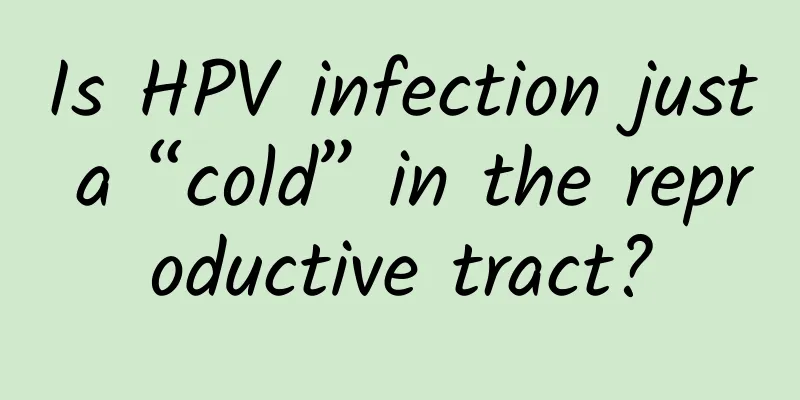Is HPV infection just a “cold” in the reproductive tract?

|
March 4th is International HPV Awareness Day. Once upon a time, HPV became a topic of concern for women. Due to misunderstandings, many female friends even equated HPV with cervical cancer. With the promotion and application of the nine-valent vaccine, some female friends used to be terrified of HPV, but now they think that as long as they get the vaccine, they can rest assured. Is this really the case? In this regard, Professor Ren Qingling, Director of the Jiangsu Provincial Traditional Chinese Medicine Obstetrics and Gynecology Innovation Center and Director of the Department of Gynecology of Jiangsu Provincial Hospital of Traditional Chinese Medicine, explains to everyone. Correct understanding of HPV HPV is the abbreviation of human papillomavirus. The routes of infection include sexual contact, close contact, indirect contact and mother-to-child transmission. The most important route is sexual contact. Among them, young age of first sexual intercourse, multiple sexual partners, early childbirth and multiple births are all high-risk factors. Ren Qingling introduced that HPV infection does not mean that there is a history of promiscuity or unclean sexual life. Similarly, not all HPV infections can cause cervical lesions and cervical cancer. Most HPV infections will be cleared by the body's immune system. To some extent, HPV infection is like a "cold" in the reproductive tract. It should be noted that HPV can be divided into high-risk and low-risk types according to its carcinogenic potential. If you continue to be infected with high-risk HPV, it may eventually progress to precancerous lesions or cervical cancer. "It takes a long process from HPV infection to cervical cancer. HPV infection - persistent HPV infection - appearance of cervical precancerous lesions (CIN) - cervical cancer, which takes at least 5-10 years. In this long process, there is enough time to reverse it," said Ren Qingling. HPV is preventable and treatable Currently, there is still a lack of recognized effective treatments for HPV infection. Modern medicine mainly includes drug therapy, physical therapy or surgical treatment, such as laser, freezing, electrocoagulation and cone biopsy, etc., which mainly achieve the purpose of eliminating HPV by removing and destroying local cervical tissue. Commonly used drugs in clinical practice include interferon, Baofukang suppository, etc., but the clinical efficacy is not certain. Ren Qingling said that vaccines play an important role in preventing HPV infection. Get vaccinated with HPV vaccines and increase the coverage of vaccination to prevent cervical cancer more widely. The "Chinese Expert Consensus on the Clinical Application of HPV Vaccines" released in 2020 recommends that women aged 9-26 be vaccinated with HPV vaccines, especially those under the age of 17. It also recommends that women aged 27-45 who are eligible be vaccinated. Regardless of the valence of the HPV vaccine, vaccination before the first sexual intercourse is more effective. We say that HPV infection is like a "cold" in the reproductive tract, and like a cold, it will recur, so whether or not you are infected with HPV, you can get vaccinated. Vaccination prevents the "next" infection. "The theory of 'prevention before illness' in traditional Chinese medicine is consistent with the HPV vaccination in modern medicine." Ren Qingling introduced that there is no corresponding disease name for persistent HPV infection in traditional Chinese medicine, but according to its clinical manifestations such as abnormal vaginal discharge and contact bleeding, it is often classified as "leucorrhea disease". Fu Qingzhu, a famous doctor in the Qing Dynasty, pointed out: "Leucorrhea is a symptom of dampness. And the name of the disease is because the belt meridian cannot restrain this disease." Later generations of doctors also treated leucorrhea from the perspective of dampness and heat, with clearing dampness and heat as the main treatment principle, supplemented by strengthening the body. For active prevention and treatment, regular cervical cancer screening is required. Ren Qingling suggested that the starting age for cervical cancer screening is 21 years old. For those aged 21-29, a TCT examination is recommended every 3 years. For those aged 30-63, TCT combined with HPV testing is recommended, which is the so-called double screening, and screening is done once every 5 years. If there are high-risk factors, more frequent examinations are required. In addition, if there is an increase in vaginal discharge or vaginal odor or vaginal bleeding after sexual intercourse, cervical cancer screening, including TCT combined with HPV testing, must be performed. Improve immunity and prevent diseases before they occur When the human body's immunity is low, viruses can easily invade, so it is very important to improve immunity and "prevent illness before it happens." Ren Qingling suggested that we should first develop good living habits and exercise appropriately according to our own conditions. Moderate aerobic exercise can improve the function of the immune system. Do at least 150 minutes of moderate-intensity exercise per week, such as brisk walking, running, swimming, etc. to enhance immunity. Keep a regular work and rest schedule, avoid long-term fatigue and staying up late, and at the same time, pay attention to keeping warm and avoid infection. Pay attention to regular diet, increase the intake of nutrients such as dietary fiber and high protein, and avoid spicy and irritating foods. Ensure adequate intake of vitamins and minerals, such as vitamin C, vitamin D, zinc and iron, which can help enhance immunity. Increase the intake of fresh fruits, vegetables, whole grains and healthy proteins. Chronic stress can lead to a compromised immune system. Finding ways to reduce stress, such as meditation, relaxing breathing, music, reading, etc., can help improve immunity. Tobacco and alcohol weaken the function of the immune system, so quitting smoking and limiting alcohol intake are very important for improving immunity. Additionally, avoiding exposure to other infectious diseases, such as the flu and colds, can reduce the burden on the immune system, allowing it to focus more on fighting HPV. |
<<: Is crying a form of therapy?
>>: Preventive nursing care: the key to reshaping a healthy life
Recommend
What to do if there are white spots on the vulva
When small white spots appear on the vulva, you m...
Symptoms of vaginal cancer
Vaginal cancer is a malignant tumor among gynecol...
What are the symptoms of bacterial vaginosis?
Bacterial vaginosis is also called nonspecific va...
What is the reason for no embryo during pregnancy?
Expectant mothers pay special attention to the ph...
What causes non-gonococcal urethritis?
Non-gonococcal urethritis is a relatively common ...
How to regulate your body for pregnancy at 40
In fact, when you are over 40 years old, you are ...
A little pain in the uterus
The most important organ in the female reproducti...
What should pregnant women eat to supplement nutrition?
People often say that mothers are great. One of t...
What is the reason for blood in female secretions?
We all know that women are very susceptible to in...
What are the treatments for Trichomonas vaginitis?
There are many common diseases among women. Vagin...
Lower abdominal pain three days after intercourse
If a man and a woman do not want to get pregnant ...
How big is the baby in three and a half months of pregnancy?
In life, many women are pregnant for the first ti...
Can I drink pure milk during menstruation?
Pure milk has high nutritional value. It is rich ...
What's wrong with a lot of vaginal discharge?
Leucorrhea is quite important for women, because ...
What are the causes of pelvic tuberculosis?
Tuberculosis mainly occurs after the endometrium ...









